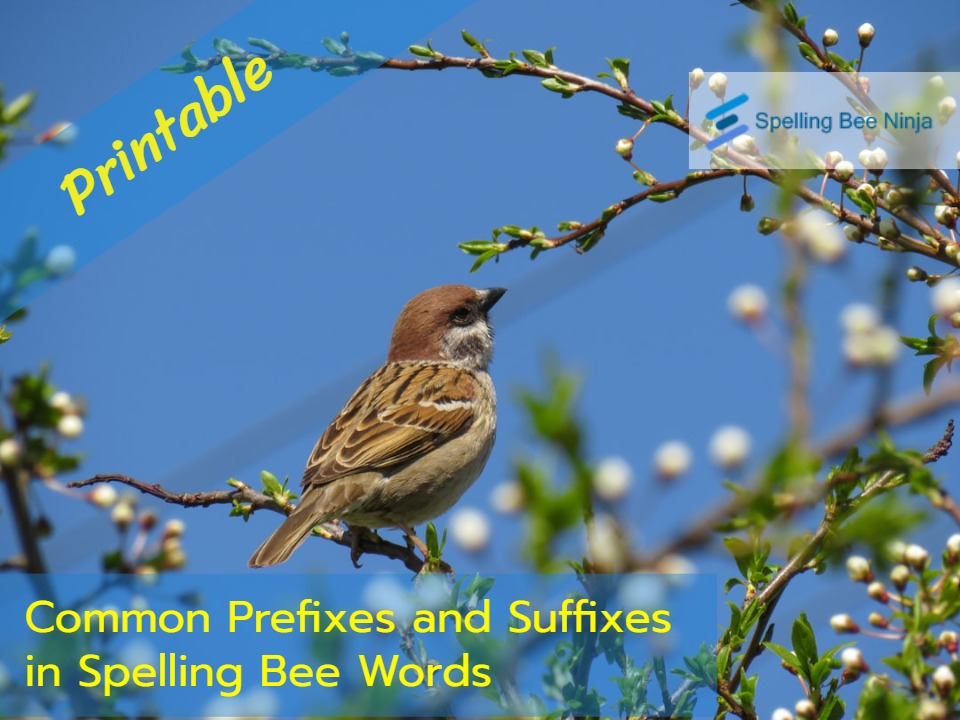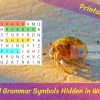Introduction
Competing in a spelling bee is both exciting and challenging. Contestants often face long, unfamiliar words that test not only memory but also knowledge of how English words are built. One of the most powerful strategies for spelling bee preparation is learning prefixes and suffixes. These small word parts, when understood, unlock patterns in word formation and help spellers make educated guesses about how to spell even words they have never seen before. This article explores common prefixes and suffixes, why they matter, and how to use them to prepare for spelling bee competitions.
Why Prefixes and Suffixes Matter in Spelling Bees
A spelling bee is not simply a test of rote memorization—it is a test of word knowledge. Many of the most difficult words in English come from Greek, Latin, and other languages, and they use predictable affixes. If you know that anti- means “against,” you can better understand and spell words like antidote, antibiotic, and antifreeze. Similarly, recognizing suffixes such as -ology (the study of) or -phobia (fear of) gives you clues to both spelling and meaning.
By studying prefixes and suffixes, spellers create a toolbox of strategies that allows them to:
Break down long words into smaller, manageable parts.
Recognize familiar patterns.
Reduce mistakes caused by confusing endings or beginnings.
Gain confidence when facing unfamiliar words.
Common Prefixes in Spelling Bee Words
Anti- (against)
Antidote, Antibiotic, Antisocial
Auto- (self)
Autograph, Automobile, Autonomy
Bio- (life)
Biology, Biography, Biodegradable
Chrono- (time)
Chronology, Synchronize, Anachronism
Dis- (not, opposite of)
Disagree, Disappear, Dishonest
Inter- (between, among)
International, Interact, Intercept
Pre- (before)
Preview, Predict, Prehistoric
Re- (again)
Rewrite, Rebuild, Replay
Sub- (under, below)
Submarine, Subconscious, Submerge
Trans- (across)
Transport, Translate, Transformation
These prefixes are common in spelling bee word lists. Knowing them not only helps with spelling but also gives context to meaning.
Common Suffixes in Spelling Bee Words
-able / -ible (capable of being)
Readable, Flexible, Accessible
-ation (process or action)
Creation, Celebration, Information
-er / -or (one who does)
Writer, Actor, Teacher
-ful (full of)
Joyful, Hopeful, Respectful
-ist (person who practices)
Artist, Scientist, Pianist
-ity / -ty (state or quality)
Purity, Clarity, Equality
-less (without)
Fearless, Hopeless, Endless
-logy (study of)
Biology, Theology, Psychology
-ment (action or process)
Achievement, Development, Government
-phobia (fear of)
Arachnophobia, Claustrophobia, Xenophobia
Many of these suffixes appear frequently in spelling bees because they create long, challenging words.
How to Study Prefixes and Suffixes for Spelling Bees
Make Flashcards
Write the prefix or suffix on one side and its meaning plus examples on the other. Regular practice reinforces memory.Build Word Families
Take one root word and add multiple affixes. For example: act → action, react, actor, active, deactivate, interaction.Learn Language Origins
Many spelling bee words come from Greek or Latin. If you know that tele- means “far” in Greek, you can confidently spell words like telephone or television.Practice with Past Spelling Bee Lists
National and regional spelling bees often release practice word lists. Study them to notice which affixes repeat.Break Down New Words
When encountering a new word, ask:What is the prefix?
What is the root?
What is the suffix?
This analysis makes the word easier to spell.
Example: Breaking Down a Tricky Word
Take the word unbelievable.
Prefix: un- (not)
Root: believe
Suffix: -able (capable of being)
By analyzing the parts, the speller avoids mistakes like unbeleavable or unbeliveable.
Another example: anthropology.
Root: anthropo (human)
Suffix: -logy (study of)
Even if the student has never heard the word before, knowledge of affixes helps spell it.
Advanced Prefixes and Suffixes for Spelling Bee Champions
To succeed at higher-level competitions, students should also study less common but frequently tested affixes:
Prefix examples: macro- (large), micro- (small), pseudo- (false), neo- (new).
Suffix examples: -cracy (rule, government), -scope (instrument for viewing), -graphy (writing, recording).
Words like microscope, pseudonym, democracy, photography are built with these elements.
Benefits Beyond the Spelling Bee
Studying prefixes and suffixes has benefits beyond competitions. It improves reading comprehension, vocabulary, and overall language confidence. Students who understand word parts can tackle academic texts, standardized tests, and advanced literature more effectively.
Reference Table 1: Common Prefixes for Spelling Bees
| Prefix | Meaning | Example Words |
|---|---|---|
| anti- | against, opposite | antidote, antibiotic, antisocial |
| auto- | self | autograph, automobile, autonomy |
| bio- | life | biology, biography, biodegradable |
| chrono- | time | chronology, synchronize, anachronism |
| dis- | not, opposite of | disagree, disappear, dishonest |
| inter- | between, among | international, intercept, interact |
| pre- | before | preview, predict, prehistoric |
| re- | again | rewrite, rebuild, replay |
| sub- | under, below | submarine, subconscious, submerge |
| trans- | across, beyond | transport, translate, transformation |
| macro- | large, great | macrocosm, macroeconomics, macronutrient |
| micro- | small | microscope, microorganism, microchip |
| neo- | new, recent | neonatal, neoclassical, neologism |
| pseudo- | false, deceptive | pseudonym, pseudoscience, pseudocode |
| tele- | far, distance | telephone, television, telegraph |
| un- | not | unhappy, unfair, unbelievable |
| in-/im- | not, into | incorrect, impossible, insert |
| ex- | out, from | export, exclude, exhale |
| super- | above, beyond | superstar, supernatural, supervise |
| hyper- | over, excessive | hyperactive, hypersensitive, hyperlink |
Reference Table 2: Common Suffixes for Spelling Bees
| Suffix | Meaning | Example Words |
|---|---|---|
| -able / -ible | capable of being | readable, flexible, accessible |
| -ation | action, process | creation, celebration, information |
| -er / -or | one who does | writer, actor, teacher |
| -ful | full of | joyful, hopeful, respectful |
| -ist | person who practices | artist, scientist, pianist |
| -ity / -ty | state or quality | purity, clarity, equality |
| -less | without | fearless, hopeless, endless |
| -logy | study of | biology, theology, psychology |
| -ment | action or process | achievement, development, government |
| -phobia | fear of | arachnophobia, xenophobia, claustrophobia |
| -scope | instrument for viewing | telescope, microscope, periscope |
| -graphy | writing, recording | geography, biography, photography |
| -ous | full of, having | dangerous, curious, adventurous |
| -ness | state, condition | kindness, darkness, happiness |
| -ship | position, state, relationship | friendship, leadership, scholarship |
| -ology | study of (variant of -logy) | anthropology, zoology, mythology |
| -cracy | rule, government | democracy, aristocracy, theocracy |
| -al | relating to, pertaining to | natural, musical, historical |
| -ize | to make, to render | organize, finalize, modernize |
| -ous / -eous / -ious | possessing, full of | courageous, spontaneous, ambitious |
Conclusion
Spelling bees challenge students to think quickly, spell accurately, and understand complex words. While memorization has its place, true success comes from mastering how English words are built. Prefixes and suffixes are the keys to unlocking spelling bee success: they reveal meaning, provide structure, and guide spellers toward correct spelling even when words seem intimidating. By practicing affixes, breaking words into parts, and studying patterns, spelling bee participants can transform difficult words into manageable challenges. Just as bees build their hives piece by piece, spellers can build word knowledge one prefix and suffix at a time—buzzing confidently toward victory.


